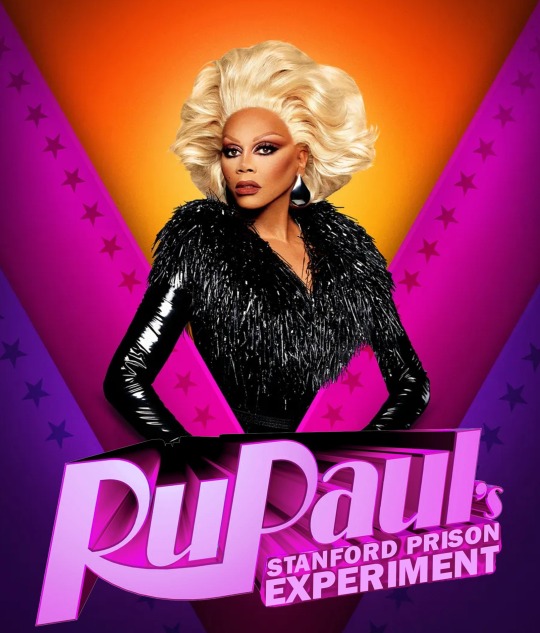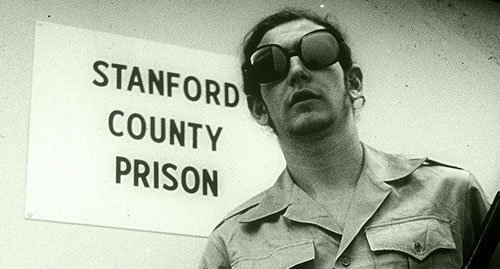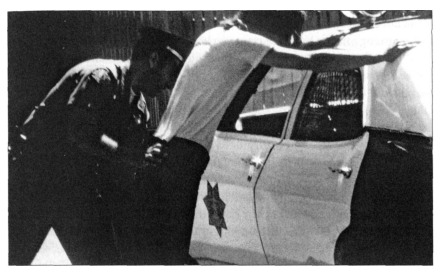#stanford prison experiment
Explore tagged Tumblr posts
Text

323 notes
·
View notes
Text
Armand loved the 60s and 70s not for the clothes or the music, because it was when all the fucked up psychological experiments were happening and he thought they were neat
#you know he went crazy for the recovered memory movement#bobo doll experiment#stanford prison experiment#milgram experiment#iwtv#interview with the vampire#armand#the vampire chronicles#assad zaman
512 notes
·
View notes
Text
one of these days there’s gonna be a game changer episode that’s just the stanford prison experiment
37 notes
·
View notes
Text
Recent research found the cruelty of Zimbardo’s prison guards didn’t emerge spontaneously; some behaviour was encouraged. Some of the “prisoners” later admitted that they were pretending to be distressed. Similarly, a study published in 2007 found that the 1964 incident that inspired the theory of the bystander effect was distorted. According to the paper, archive material shows far fewer people witnessed the incident than was reported at the time, and some people could only hear screams, without seeing the location of the incident. At least one person did try to intervene. Recent research indicates that bystanders are much more likely to intervene than the theory suggests. A 2019 study of 219 violent situations from cities around the world caught on CCTV showed that bystanders – not just one, usually several – intervened to help victims 90% of the time. The study also found that the more people were present, the more likely passers-by were to intervene. In the words of the study’s lead researcher, Richard Philpot: “It shows that people have a natural inclination to help when they see someone in need.” The burgeoning field of “heroism studies” also questions the bystander effect. In a recent article for The Conversation, I described how acts of heroic altruism are common during terrorist attacks, when people often risk their own lives to help others. Consider the following situation: you’re standing on a train platform. The person next to you suddenly faints and falls on to the track, unconscious. In the distance, you can see a train approaching. What would you do? You might doubt whether you would act heroically. But don’t underestimate yourself. There is a strong possibility that, before you knew it, you would find yourself on down on the track, helping the person to safety. There is a growing awareness amongst researchers that heroism is natural and spontaneous, and by no means exceptional.
#psychology#altruism#Heroism Studies#bystander effect#Stanford prison experiment#Kitty Genovese#Philip Zimbardo
580 notes
·
View notes
Text
The many terms of pop psych and how they are all flawed
Narcissistic abuse, coined by an Isreali to get lessened prison sentence. Claiming he had narcissism and was self hating and claimed those with npd do not exist as real people, only reflections. Having no true self. And unable to heal. And believes those with npd in relationships always view the other person as a mother (none of this is backed by science).
And promoted retraumatizing npd people and anyone else with ptsd for "therapy"
"Psychopath": has always only been a legal term. The 2 factor model was found to have various problems including many wildly different disorders to the point of irrelavance and only used to give worse prison sentences all while trying to stop any research on it because kept finding problems. (And its been shown people can actually be encouraged to do bad things because not aspd)
"Porn addiction" when ted bundy was arrested, he claimed he just looked at more and more severe porn and that led him to do those actions. As a defense for lower sentence. He was vanilla and follow up studies found no correlation. However christian groups used this to try to take down porn. Porn addiction was found to be unrelated to how sexist, how often look at porn, how much, how extreme. Just how self hating you are.
Maslows hierarchy. Found to be wrong across different cultures, people, time in life, situation. And was created by someone that believed psychology should never include mentally ill in studies and was anti vaccines cause he was a eugenicists that believed they would save lives.
Love languages. Baptist minister with no psychology knowledge that created it to try to convince his wife to sleep with him more.
Mbti. Created by authors with no psychology knowledge who were bigoted but inspired by a work from a psychologist who specifically stated it went nowhere and couldn't be used for psychology.
Brainwashing. This was created during the cold war for reasons why people would become a communist or join a weird religion or be an atheist. No evidence backing but the belief in it existing used as an excuse to torture and abuse people to get them "out" of that state. Which caused long term harm.
Stockhom syndrome: created during the worry of brainwashing being at it's height. A continuation for reasons why wouldn't they trust the police. Even though it was found out to fit only 8% of the time.
Stanford prison experiment or the belief that authority means no control on actions by people under it and authority makes you do terrible actions. Done shortly before the start of the cold war. And helped give excuse for reasons same with brain washing.
Even just 4 years after its start it was criticized for usage of demand characteristics (people assuming what an expirement is testing so acting out specific behaviors to fit with their thoughts of what the results should be) cause...no concrete "prisoner behavior". And that the participants were acting out roles rather then any actual influence of authority or controlled by authority. Just participants acting out stereotypes they believed researchers wanted. While also suffering selection bias.
Most of the "guards" in the experiment even directly stated later that they were intentionally acting.
There is probably a lot im missing(if you want to add other terms, feel free). But the point stands. Pop psych uses psychology like things to seem legitimate, but for their own harmful agendas.
#narcissistic abuse#pop psychology#psych2go#stanford prison experiment#red scare#stockhom syndrome#mbti#love language#aspd stigma#npd stigma#ableism#sheep speaks#empaths
16 notes
·
View notes
Text
remember when game changer changed normally? we used to be making a noise and toys and talking to people on the street. we have progressed to psychological torture.
lord of flies was right I think- *gets shot*
#I should preface#I have never read lord of the flies#nor know much about it#dropout#game changer#stanford prison experiment
88 notes
·
View notes
Text
love island except it’s the Stanford prison experiment
#love island usa#nicolandria#love island season 7#love island huda#love island cierra#fujoshi#peacock#peacock love island#stanford#stanford prison experiment#hopecore
13 notes
·
View notes
Text
We’re watching the Stanford Prison Experiment for my psych class and someone looks awfully familiar… it’s Minho!

16 notes
·
View notes
Text
Aw, baby's first Stanford prison experiment.
21 notes
·
View notes
Text
everytime i hear about a psychology study conducted before 1974 i know i’m about to hear about the most unhinged unethical shit
9 notes
·
View notes
Text

I cannot overstate the cultural impact this man had on anyone who took AICE Psychology in 2013.
10 notes
·
View notes
Text
Christina Maslach, poster girl of the "I can fix him" movement.
#my random stuff#christina maslach#philip zimbardo#stanford prison experiment#christina; girl you can't fix him#he literally forced the american and british psychological association to change their guidelines because he fucked up so badly#and to this day he feels no guilt over it
11 notes
·
View notes
Text

The Stanford prison experiment was a human experiment to psychologically study the human responses to captivity. Half the subjects had to play the role of inmates, and the other half prison guards, living in a prison environment. The experiment was conducted by Philip Zimbardo of Stanford University in 1971.
The inmates and prison guards adapted to their roles and even stepped beyond the boundaries of what had been predicted, which lead to psychologically damaging and dangerous situations. One-third of the prison guards were judged to have exhibited “genuine” sadistic tendencies, while many prisoners were emotionally traumatized and two had to be removed from the experiment early.
Finally, Zimbardo, alarmed at the increasing abuse and anti-social behaviour, terminated the experiment earlier than intended.
82 notes
·
View notes
Text
Let's be real, if the Stanford prison experiment involved any other population but white male Ivy League students, it would have continued the whole term.
2 notes
·
View notes
Text
sooner or later MrBeast is going to try and recreate the Stanford prison experiment
13 notes
·
View notes
Text
SPE -- Stanford Prison Experiment
THE LUCIFER EFFECT Understanding How Good people Turn Evil by Philip Zimbardo a 561 page book about consensual role play that becomes very non-consensual. It is about the Stanford Prison Experiment, Aug 14, 1971 – Aug 21, 1971. (I was a freshman in college at the time.)
I is available as a .pdf at: https://ia802808.us.archive.org/0/items/TheLuciferEffectUnderstandingHowGoodPeopleTurnEvilISBN9781400064113/The%20Lucifer%20Effect%20-%20Understanding%20How%20Good%20People%20Turn%20Evil%20%28ISBN-978-1-4000-6411-3%29.pdf or Amazon: https://www.amazon.com/Lucifer-Effect-Understanding-Good-People/dp/0812974441/ or Your library. DD: 155.962 Zim 2007 LOC: BF789.E94Z56 2007

#Stanford#SPE#Stanford Prison Experiment#consensual role play#non-consensual#prisoner#handcuff#prison#Aug 14#Stanford University#August 1971
11 notes
·
View notes